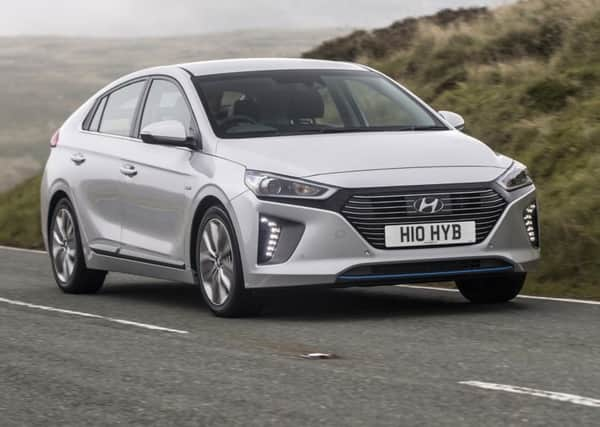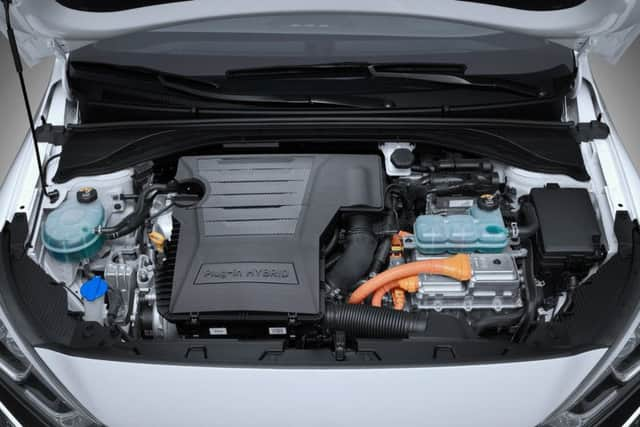Review: Hyundai Ioniq,


It’s not just the older cars that are mucky. I was behind a newish airport taxi van last week which trailed diesel smoke every time it set of up a long hill. I “rang it in” to the operators – who presumably hadn’t noticed the filth coming out of the tailpipe.
Engines running inefficiently waste fuel, too. Most drivers can save fuel by slowing down. Higher speeds use more fuel but they don’t save much significant time on today’s congested roads. Overtaking on many roads has become pointless and can look antisocial as you hop in and out of the traffic ahead. You may be making progress but not for long.
Advertisement
Hide AdAdvertisement
Hide AdSales of new diesel cars, whatever blandishments and assurances the makers promise, continue to fall. In May they fell for the 14th month, down 23.6 per cent on previous year’s figures. Sales of petrol cars rose by the same percentage – buyers aware that the latest models can give decent economy and are cheaper anyway.


The other booming area is the hybrid electric/petrol car, up by 36 per cent in May to reach 5.8 per cent of total sales. Within this sector, plug-in hybrids, which can be charged from the national grid, rose nearly 73 per cent and zero emission electric cars were 18.7 per cent up. In passing, most of the top ten sellers are not even available as hybrids. Ford’s top ten trio are conventional, and this biggest UK seller only offers one hybrid car, the Mondeo.
This week’s ride, the Hyundai Ioniq, is available as hybrid, plug-in hybrid and fully electric. It is a striking shape, a one-off bespoke four-door liftback body – with the tailgate glazing extended below the rear boot lip to give extra vision. The face is a massive grille – blanked off in the electric model.
Much as I’d like an electric car for most of my driving, I can’t have a home charger and am put off by having to find a public charger and possibly wait in line. A plug-in hybrid offers some of the range of full electric but still needs charging from the mains.
So, there we were in the hybrid, which combines a 1.6 litre petrol engine with an electric motor and a six-speed automatic gearbox. The combined power is 139bhp and 195 lb ft of torque. The same drive train is used in the Kia Niro, a bespoke five-door design from Hyundai’s partner.
The Ioniq arrived nearly two years ago, when the market share of hybrid and electric cars was 3.3 per cent. A prediction from the charging installers Pod Point was 10 per cent share by 2020. Time is running out.
Since the UK launch there have been a few changes to the Ioniq, including paddle gear shifters on the hybrid. The 2019 models will have the latest Euro emissions ratings.
The standard (and cheaper) hybrid is most popular, taking almost 80 per cent of sales, while the electric model has declined from a 15 per cent share to 4.6 per cent and the plug-in Ioniq has risen to 16pc share. Perhaps because of this the current list has reduced the price of the electric car to match the plug-in.
Advertisement
Hide AdAdvertisement
Hide AdAwards so far include supreme car title from the Women’s Car of the Year panel and the electric version was voted the German automobile association’s most eco-friendly car.
The hybrid’s entry price to Ioniq motoring is £21,240 for the SE. The electric models start at £25,345 for the Premium, now the same price as the comparable Plug-in. These prices are after government grants have been deducted, plus the current offers from Hyundai.
My demo car was the Hybrid Premium SE, as tested £25,450 with grey metallic paint, equipped with both heated and cooled front seats, a heated wheel rim, navigation, a wireless phone charging pad, and even a charging USB in the driver’s arm rest. There’s an alert for traffic crossing at the rear, emergency braking, door mirror puddle lights, blind spot warning, even an active air flap in the front grille.
If you called in to the showroom just to browse, a half-decent salesman would have an easy job.
Verdict: I liked it. The economy is higher than most cars I have driven.